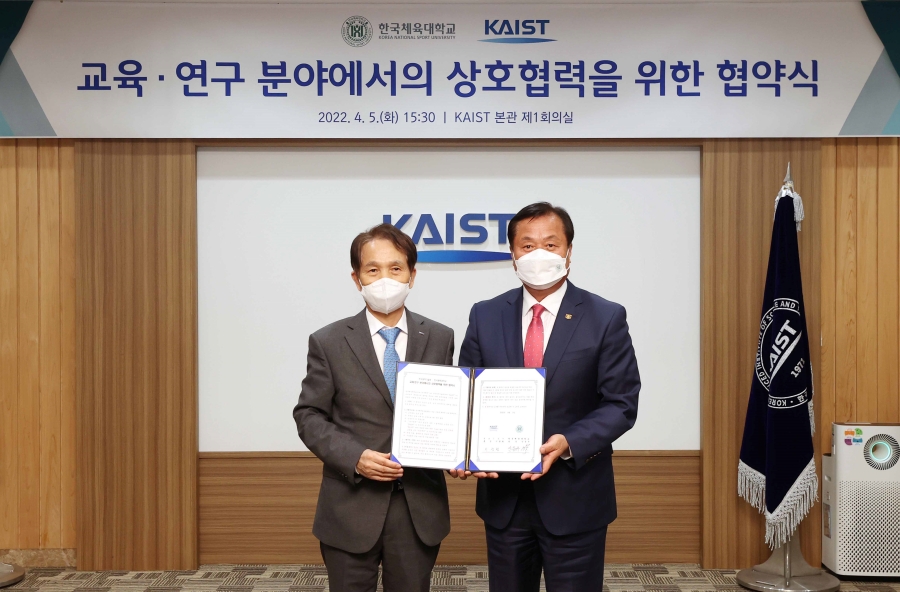event

< KAIST President Kwang Hyung Lee (left) and KNSU President Yong-Kyu Ahn pose after signing the MOU on April 5 at the KAIST main campus. >
KAIST President Kwang Hyung Lee signed an MOU with Korea National Sport University (KNSU) President Yong-Kyu Ahn for collaboration in education and research in the fields of sports science and technology on April 5 at the KAIST main campus. The agreement also extends to student and credit exchanges between the two universities.
With this signing, KAIST plans to develop programs in which KAIST students can participate in the diverse sports classes and activities offered at KNSU.
Officials from KNSU said that this collaboration with KAIST will provide a new opportunity to recognize the importance of sports science more extensively. They added that KNSU will continue to foster more competitive sports talents who understand the convergence between sports science and technology.
The two universities also plan to conduct research on body mechanics optimizing athletes’ best performance, analyze how the muscles of different events’ athletes move, and will propose creative new solutions utilizing robot rehabilitation and AR technologies. It is expected that the research will extend to the physical performance betterment of the general public, especially for aged groups and the development of training solutions for musculoskeletal injury prevention as Korean society deals with its growing aging population.
President Lee said, “I look forward to the synergic impact when KAIST works together with the nation’s top sports university. We will make every effort to spearhead the wellbeing of the general public in our aging society as well as for growth of sports.”
President Ahn said, “The close collaboration between KAIST and KNSU will revitalize the sports community that has been staggering due to the Covid-19 pandemic and will contribute to the advancement of sports science in Korea.”
-
research RAIBO Runs over Walls with Feline Agility... Ready for Effortless Search over Mountaineous and Rough Terrains
< Photo 1. Research Team Photo (Professor Jemin Hwangbo, second from right in the front row) > KAIST's quadrupedal robot, RAIBO, can now move at high speed across discontinuous and complex terrains such as stairs, gaps, walls, and debris. It has demonstrated its ability to run on vertical walls, leap over 1.3-meter-wide gaps, sprint at approximately 14.4 km/h over stepping stones, and move quickly and nimbly on terrain combining 30° slopes, stairs, and stepping stones. RAIBO is ex
2025-06-04 -
research Professor Hyun Myung's Team Wins First Place in a Challenge at ICRA by IEEE
< Photo 1. (From left) Daebeom Kim (Team Leader, Ph.D. student), Seungjae Lee (Ph.D. student), Seoyeon Jang (Ph.D. student), Jei Kong (Master's student), Professor Hyun Myung > A team of the Urban Robotics Lab, led by Professor Hyun Myung from the KAIST School of Electrical Engineering, achieved a remarkable first-place overall victory in the Nothing Stands Still Challenge (NSS Challenge) 2025, held at the 2025 IEEE International Conference on Robotics and Automation (ICRA), the world
2025-05-30 -
event Formosa Group of Taiwan to Establish Bio R&D Center at KAIST Investing 12.5 M USD
KAIST (President Kwang-Hyung Lee) announced on February 17th that it signed an agreement for cooperation in the bio-medical field with Formosa Group, one of the three largest companies in Taiwan. < Formosa Group Chairman Sandy Wang and KAIST President Kwang-Hyung Lee at the signing ceremony > Formosa Group Executive Committee member and Chairman Sandy Wang, who leads the group's bio and eco-friendly energy sectors, decided to establish a bio-medical research center within KAIST and i
2025-02-17 -
research KAIST develops ‘Hoverbike’ to roam the future skies
< Photo 1. A group photo of the research team > Hoverbike is a kind of next-generation mobility that can complement the existing transportation system and can be used as an air transportation means without traffic congestion through high-weight payloads and long-distance flights. It is expected that domestic researchers will contribute to the development of the domestic PAV* and UAM markets by developing a domestically developed manned/unmanned hybrid aircraft that escapes dependence
2024-12-27 -
event KAIST’s RAIBO2 becomes the World’s First Robo-dog to Successfully Complete a Full-course Marathon
KAIST's quadrupedal walking robot "RAIBO", which can run seamlessly on sandy beaches, has now evolved into "RAIBO2"and achieved the groundbreaking milestone by becomeing the world's first quadrupedal robot to successfully complete a full-course marathon in an official event. < Photo 1. A group photo of RAIBO2 and the team after completing the full-course marathon > KAIST (President Kwang Hyung Lee) announced on the 17th of November that Professor Je Min Hwangbo's research team of t
2024-11-17